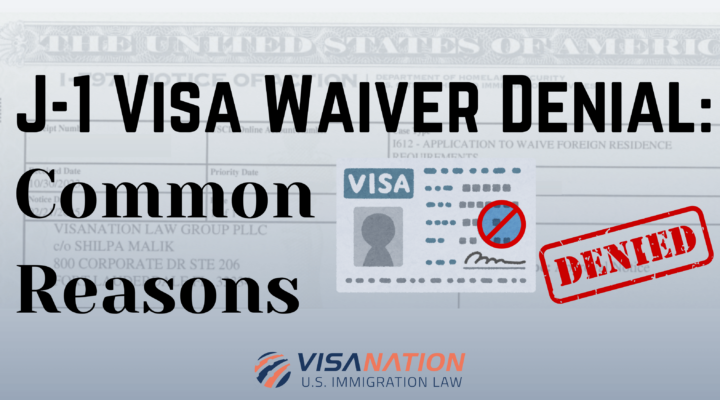J1 Visas are issued to individuals who the United States government approves to work or participate in cultural exchange visitor programs. There is a foreign residency requirement that J-1 visa holders may be subject to, after completing their program. If you have a J1 visa waiver denied or approved you may have other options available.
Understanding the J1 Waiver Process
Before worrying about a J1 waiver denial, it’s important to understand the process. A J1 visa holder subject to the two-year home residency requirement must apply for a waiver through the U.S. Department of State.
How to Apply for a J1 Waiver
- Submit Form DS-3035 and a statement of the reason for the J1 waiver, outline your request
- Submit Fee Payment
- Upload supporting documents (e.g. DS-2019, Curriculum vitae, Contracts, etc.)
- Wait for Processing: Ensure that your contact information is up to date, as the waiver process can take several months, depending on the chosen statutory basis and processing times.
- Decision: If approved, the waiver removes the home residency obligation, allowing the individual to change their visa status, apply for a green card, or pursue work opportunities in the U.S.
How Long Does It Take to Get a J1 Waiver?
J1 waiver processing times vary significantly depending on the basis under which you apply. The processing times range anywhere between 6 and 18 months, which includes the time from submission to decision. However, certain waivers, such as those requiring government agency involvement, may take longer.
Once the waiver is approved, individuals may also explore J1 waiver jobs in the U.S. as they will no longer be restricted by the home residency requirement.
Applicants can check their case status through the visa waiver status online system to monitor updates. Delays can occur if documents are missing or if additional information is requested.
Statutory Bases for Visa Waiver
As a foreign exchange visitor, there are five bases from which you can apply for a J-1 Waiver.
- The first is the “No Objection” statement from your home country.
- The second is a request from an interested Government Agency in the U.S. (otherwise known as an IGA waiver).
- The third is a claim of persecution in your home country, should you return.
- The fourth is a claim of exceptional hardship.
- The fifth is a request from a designated State Health Agency.
Obtaining a waiver of the two-year home residence requirement is not always the easiest task to undertake.
What is the home residence requirement?
The home residence requirement mandates that J visa holders must live in their home country for two full years (or obtain a waiver) before becoming eligible for an H visa, L visa, or permanent resident status.
J1 Waiver Denied
Was your J1 waiver denied or rejected after submission? If you find yourself in this situation, the bad news is that the Waiver Review Division within the Department of State typically won’t reconsider your application, as they conduct a rigorous review before a final decision is made.
With that being said, you can file an appeal or Motion to Reopen or Reconsider the Waiver Review’s determination of a denial. Nonetheless, you may be able to apply for a different statutory basis (mentioned above) for the waiver.
An immigration attorney will best be able to determine which statutory base applies to your case. To learn more about a J1 waiver appeal or other options, contact our attorneys for an initial consultation.
Along with your J1 waiver denial, you’ll also receive the particular reason for the denied waiver. In general, if you have received government funding, either from your home country or the United States government, then a no-objection waiver will generally be denied. You have a better chance of receiving approval if you filed under a different statutory base.
If you filed a waiver based on both the fear of persecution and exception hardship, be aware that this is not proper protocol. These waivers should not be combined.
A motion to reopen is filed if there is new evidence or new facts that were not available the time of the original decision, like a change in country conditions.
A motion to reconsider is filed when you believe that USCIS made a legal error when making its decision.
What to Do if Your J1 Waiver is Denied
If your J1 waiver is denied, there may be other options available. Typically, the best course of action is to determine whether you qualify under a different statutory basis.
For example, if a No Objection Statement waiver was denied due to government funding, applying under exceptional hardship or persecution may be a better option.
An immigration attorney can assess your case and help you strategize the best approach.
Denial After Receiving New Information
In some cases, you may have your J1 waiver denied after receiving information that could alter your eligibility. If that’s the case you may be able to file a new application in the case of exceptional hardship to a citizen, spouse, or child or based on persecution.
Requesting a No Objection Statement
- Step One: Complete the online waiver application to receive your waiver case number
- Step Two: Request No Objection Statement from your home country’s government
- Step Three: If denied, explore other statutory waiver bases like persecution or exceptional hardship
You should receive a case number upon completing the online application. We’ve seen instances in which a home country did not issue a no-objection statement on our client’s behalf.
As you can imagine, this is a roadblock for the rest of the process. When this occurs, you may apply for a recommendation under other statutory bases that apply to your case.
What if none of the other bases apply to my case?
If this occurs, you’ll usually need to fulfill the 2-year home country presence requirement.
Common Reasons for J1 Waiver Denial
J1 waiver applications undergo rigorous review, and even small mistakes can lead to rejection. Common reasons for denial include:
- Applying under an incorrect statutory basis promptly
- Failing to provide enough supporting evidence, especially for hardships or persecution claims.
- Submitting incomplete or inconsistent documentation
- Inadmissibility (criminal history)
- Attempting to combine waiver types that should be filed separately (e.g., persecution and hardship)
- Receiving funding from the U.S. government, which often weighs against approval
The Waiver Review Division will deny a recommendation application when the reasons presented don’t outweigh the program and/or foreign policy considerations for the exchange visitor program.
If your waiver is denied for one of these reasons, you may have the option to reapply with stronger evidence or explore alternative paths to remain in the U.S.
Alternative Options After a J1 Waiver Denial
A J-1 waiver denial does not necessarily mean you must leave the U.S. immediately. Here are some alternative options to consider:
- Apply Under a Different Waiver Category – If denied under one basis, you may qualify for Exceptional Hardship, Persecution, or an Interested Government Agency (IGA) waiver.
- Change Your Visa Status – Consider switching to an H-1B (employment), O-1 (extraordinary ability), or F-1 (student) visa, if eligible.
- Fulfill the Two-Year Home Residency Requirement – If no waiver is possible, complying with this rule may allow future visa applications.
- Seek Employment Abroad – Working in a third country can provide career opportunities while keeping future U.S. immigration options open.
- File a Motion to Reopen or Reconsider – If new evidence arises or a legal error was made, you may challenge the denial.
How VisaNation Law Group Can Help
At VisaNation Law Group, their J1 Visa Lawyers have extensive experience handling J1 visa cases as well as J1 waivers denied based on “no objection”. If you have received a denial notice, it’s important to address it in a timely manner. You may be able to file under a different statutory base or take alternative action.
Contact us by filling out this free assessment form.
RELATED J-1 WAIVER DENIED TOPICS
- J-1 Visa
- J-1 Visa Extension
- J-1 Visa Waiver
- J-1 Visa Waiver for Physicians
- J-1 Waiver Green Card Process
- J-1 Waiver IGA
- J-1 Waiver-IGA for Physicians
- J-1 Waiver-No Objection Statement
- J-1 Visa Waiver-Exceptional Hardship
- Foreign Residency Requirement
J-1 Waiver Frequently Asked Questions (FAQs)
Below are some J-1 visa FAQs that we commonly receive.
Can I continue working while waiting for a J1 waiver decision?
Your work authorization depends on your current visa status. If your J1 visa is still valid, you may continue working under its status. However, if your waiver is denied, your ability to stay and work in the U.S. may be impacted.
Can I appeal a J1 waiver denial?
There is no formal appeal process, but you may reapply if you qualify under another statutory basis or present new evidence.
How do I check my J1 waiver status?
You can check your application status through the U.S. Department of State’s Waiver Review Division website using your case number.
What happens if I don’t leave the U.S. after a J1 waiver denial?
If your waiver is denied and you remain in the U.S. past your visa’s expiration, you could be out of status, which may affect your ability to obtain future visas.









